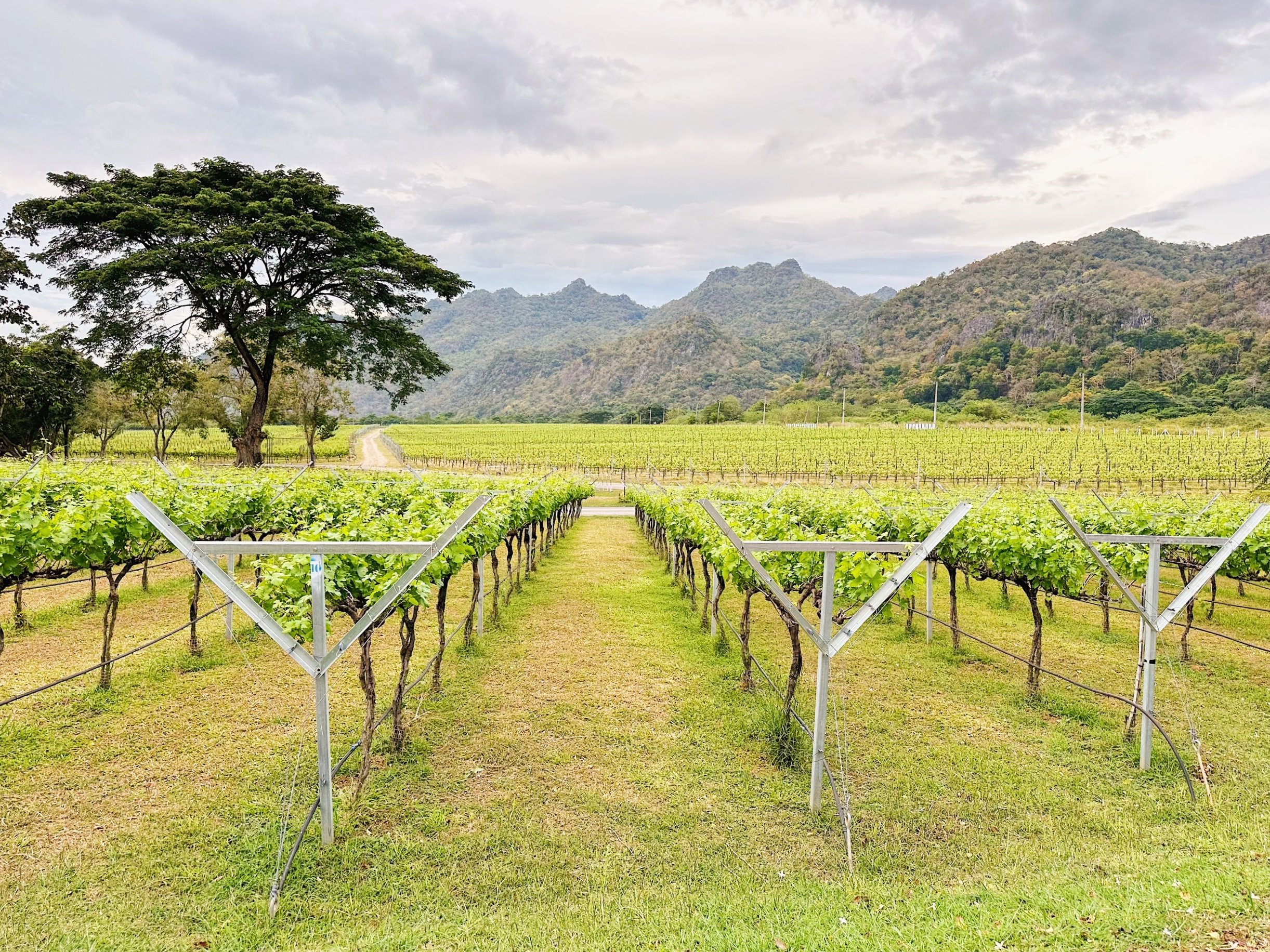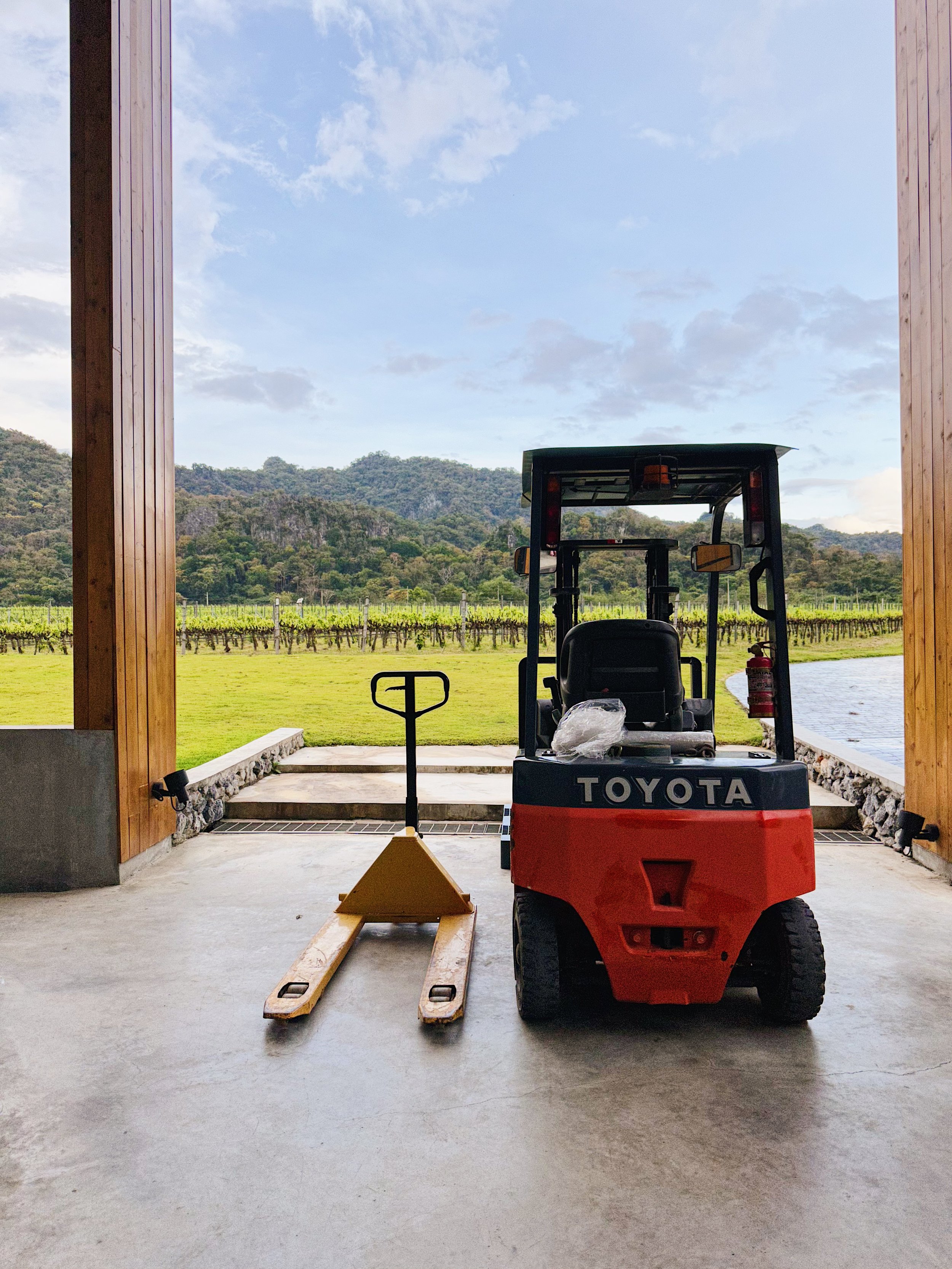produced by GranMonte
Driving north of Bangkok into a humid, tropical landscape, the last thing you’re expecting to see is rows and rows of vines. Unlikely as that may be, Khao Yai is one of three major regions used for Thai winemaking - a new industry for Thailand, dating back only three decades.
One vineyard which calls this particular region home is GranMonte, a family-run business that started its journey when Visooth Lohitnavy, along with his wife and two daughters, purchased a cashew plantation and cornfield in 1997. While the family were early adopters in Thailand’s wine industry, they weren’t the first, with Chateau de Loei, run by hotelier and construction tycoon Dr Chaijudh Karnasuta, beating them to Thailand’s first wine grape harvest and sale to the mass market in 1995.
It’s a market that has come a long way in a short time, taking the lead in the category now known as ‘New Latitude Wines’. New Latitude derives from the concept that regions between 30 and 50 degrees latitude (both north and south of the equator) provide ideal temperatures to make fine wines. Thailand is around 15 degrees north of the equator - far outside of that range - and the feat of grape growing and winemaking therefore falls within the New Latitude group. In comparison, England also falls outside of the 30-50 latitude at around 52 degrees latitude, a much closer match for grape growing.
As with all regions outside of the ideal latitude, there are other geographical features at play that support grape growing in that location. In the case of Khao Yai, this wild and mountainous region is known for its cooler temperatures, but GranMonte is also shielded by mountains to shelter vineyards from the worst of the rainy season. Of course, weather is still a challenge out here and Smart Vineyard systems that track weather patterns are a huge help for the team.
Thailand’s not the only warm weather destination to take to winemaking in the last few decades. Other regions include India, Brazil, Kenya and even the predominantly muslim country of Indonesia is taking a crash course in viticulture. Thailand however seems to be getting a lot more recognition than the competition, and GranMonte stands firmly at the forefront of that. While other vineyards, such as Monsoon Valley, have hired foreign talent to lend expertise to the wine production, Nikki Lohitnavy (Visooth’s daughter) has made it her mission to gain as much of her own knowledge as she can, firstly by studying viticulture and winemaking at Adelaide University and later gaining experience globally in Portugal, South Africa, Australia. Now she works in her own family’s business at GranMonte and continues to gain worldwide experience by applying her knowledge in vineyard consultation.
One aspect of running GranMonte’s vineyards with the global market in mind is figuring out which international variety will adapt to the climate and produce the highest quality of wine. Syrah and Chenin Blanc seem to be out in the lead in this respect, with lots of inspiration taken from the Australian Shriaz market.
The Orient Syrah, although one of GranMonte’s more prestige bottles, is a good place to start with Thai Wine. While vanilla and some lightly oaky qualities show that the wine has seen GranMonte’s very own barrels, the woodiness is well balanced with rich red and black fruits to make it good for easy drinking but with enough flavour to stand up to food.
Food in general is a huge selling point when it comes to GranMonte wines and a lot of consideration is given to pairing these wines with options of Western or Thai food - you can even sample some of the suggestions at the estate’s restaurant VinCotto.
Red options from the producer really did stand out the most in terms of drinkability, but white wine is possibly a more popular pairing with the herbal spiciness of Thai cuisine and the options are vast. Midnight Harvest, a Chenin Blanc blend, is one such example, with the name nodding to the late nights (or early mornings) the vineyard team pull in order to preserve freshness in GranMonte’s grapes.
Chenin Blanc has a varied profile from light whites in the Loire to a much punchier flavour that comes from the coasts of South Africa. GranMonte’s interpretation sits somewhere in between with peach and pear dancing on the palette in front of a small indication of vanilla and toast. It makes a perfect pairing for meatier seafood and light meats such as chicken and pork.
If Chenin Blanc isn’t for you, Gradient Verdelho gives the Portuguese grape a good showing of minerality alongside tropical notes of guava and pineapple, suiting Thai seafood well. Even rosé drinkers can rejoice with the options ranging from pink bubbly to the Sakuna Rosé, named for Visooth’s wife and partner in business, offering fresh strawberries, hints of pineapple and a satisfying creaminess.
In short, GranMonte’s range is as diverse as the country’s cuisine, and they are just the start of a promising wine scene in Thailand. With more young drinkers experimenting and picking up a glass, it looks like there is good stuff on the horizon.
Check out our photo journal for Bangkok for more places to visit while you’re in Thailand.






















